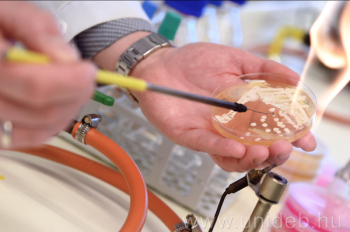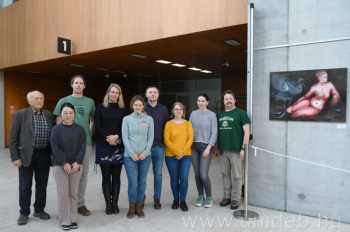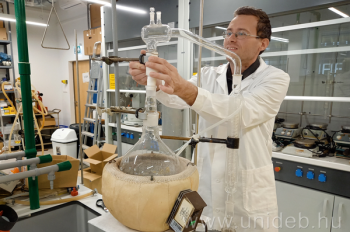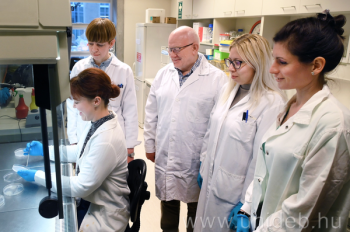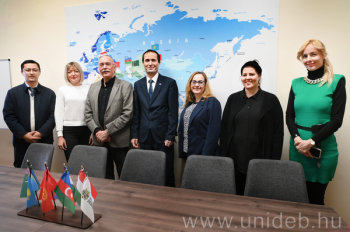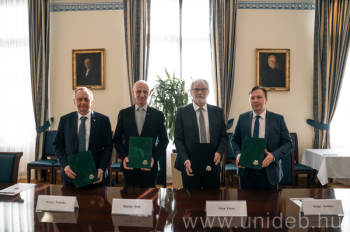Doctoral students who have been awarded GTIDEA Kiválósági PhD Ösztöndíj [GTIDEA Excellence Ph.D. Scholarship] could get acquainted with world-renowned oncology researcher Rene Bernards and his experiences of a career in research. During the course of Professor Bernards' visit to Országos Onkológiai Intézet [National Institute of Oncology], which occurred in the framework of a program coordinated by the international organization EURACAN, the young scientists were also informed about the latest developments and research trends in oncology.
Hírek Research címkével
A super-resolution laser microscope has been used recently at the Faculty of Medicine of the University of Debrecen primarily in cancer research and skeletal muscle research. It can also be applied to observe the function and interactions of biological macromolecules. This piece of equipment is already being put to use by several institutes of the faculty in a variety of research projects but, in the future, it could also play an important part in scientific collaborations with national and international partners.
How could artificial intelligence (AI) prove to be helpful in finance, accounting and business administration? How can the appropriate use of AI affect the economic situation of businesses in our region? These are but two of the questions that the Faculties of Economics and Business of the University of Debrecen and the University of Oradea are exploring in a joint program launched recently. In addition to implementing knowledge transfer, this one-year project also aims to deepen cross-border professional and academic connections.
Biotechnology is one of the fastest growing fields of science: pharmaceuticals, medicine, agriculture, food and the environment are all using such techniques. The University of Debrecen launched the biotechnology programme in 1987, and it has been available as a stand-alone BSc course for three years.
The genome libraries of two protected moths, the striped Jersey tiger moth (Euplagia quadripunctaria) and the eastern eggar (Eriogaster catax), are being prepared currently by experts at the University of Debrecen within the framework of an international collaboration. The researchers’ aim is to understand the genetic structure of the moths to help conservation management in species protection.
Ghanem Amr Sayed, Assistant Professor at the Department of Health Informatics, Faculty of Health Sciences, DE, has investigated the impact of sociodemographic and lifestyle factors on oral hygiene in his research, which was awarded the Publication Prize of the Gróf Tisza István Foundation for the University of Debrecen. A survey of the Hungarian population found that gender, education and dental treatment also play a role in oral hygiene.
Novel drug candidate compounds, which are currently unique in the world and likely to be effective in the treatment of malaria, have been produced at the Faculty of Pharmacy of the University of Debrecen. The outstanding achievement of the researchers involved has been recognized by a publication award by Gróf Tisza István Debreceni Egyetemért Alapítvány [Count István Tisza Foundation for the University of Debrecen].
A group of experts from the University of Debrecen are also among the participants of a European research and innovation project whose objective is to investigate the impact of climate change on the emergence of toxic mycotoxins, for example, in wheat and corn (maize). This project, based on an international collaboration, was made possible by the previous successful joint research efforts of the University of Debrecen and the National Food Chain Safety Office (Nébih - Nemzeti Élelmiszerlánc-biztonsági Hivatal).
The production of several new herbal preparations is in the pipeline due to the cooperation between the Faculty of Pharmacy of the University of Debrecen and the Tashkent Institute of Pharmacy, which has been developed in recent years. There are also plans to jointly research and develop bacteriophage-based pharmaceuticals.
The University of Debrecen and the Joint Institute for Nuclear Research have signed a cooperation agreement. The multidisciplinary international centre for basic research in nuclear physics and related science and technology invites researchers from Debrecen to participate in projects in its seven laboratories.



